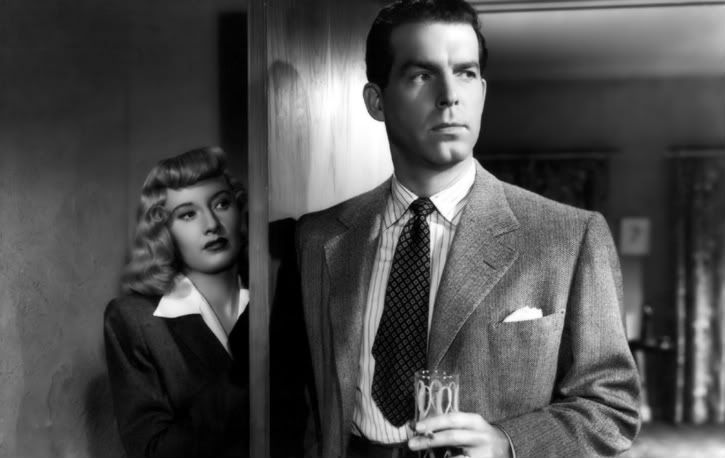
This is my reaction paper from a college film noir class. Originally written in 2003.
Spoiler...
The first reason why "Double Indemnity" (1944), directed by Billy Wilder, is a classic film noir is the soundtrack, the music is tense and dark, and there is a common thread of it throughout the film. Every time Walter (Fred MacMurray) and Phyllis’ (Barbara Stanwyck) web of evil grows larger, the same theme starts playing in the background, almost like the ominous voice of some sort of inner conscience.
The second reason is the lighting in this movie is top notch noir lighting. Plot point number one, where Phyllis first comes over to Walter’s apartment and the seeds of their evil are sown by their first adulterous kiss, is the first scene that is only lit from outside of the room. The crisis/climax scene is another scene lit the same way. This time the only light is through a Venetian blind in Phyllis’ study.
The third reason why this is classic noir is the actor’s performances. Edward G. Robinson‘s Keyes, was the perfect foil for the intellectual machinations of Walter. Everything about Keyes’ physical presence was non-threatening; he can’t even seem to ever light his own cigar, and yet the wheels were always turning in his mind and it was clear from the first scene that he prized truth above emotions. You almost feel sorry for the man who got caught by Keyes for sabotaging his own truck, but Keyes shows him no mercy.
Walter has some great noir lines at the beginning of the movie. He says, “I killed him for money and a woman. I didn’t get the money or the woman.” Soon after that he says, “I never knew that honeysuckle could smell like murder.” He knows that Phyllis can only be bad for him, but he is drawn to her. He tries to keep his mind off her by bowling and drinking, but his thoughts never stray far from her ankles and her mysterious allure.
The writing of this screenplay was very tight. There isn’t a single wasted character or scene in the whole film. For a while I thought that the daughter Lola and her somewhat bizarre boyfriend Nino were nothing but filler, but by the end of the movie Lola manages to humanize Walter’s character and give him a little sympathy. While the revelation that Phyllis is having a relationship with Nino seems to make her that much more evil and inhuman. After Walter murders Phyllis, he stops Nino from going inside the house and possibly getting blamed for Phyllis‘ murder, which was Walter’s original plan. This is the resolution of the tension of the movie and the turning point of Walter’s character. We are left to wonder what changed in Walter’s character, did he give up? Did his love for Lola make him blindly act towards her happiness alone? We will never know.
The murder plan in this movie struck me as kind of dumb. I have no clue how someone who dies by falling off a train and someone who dies from being strangled can look at all similar. Another thing that bothered me was the fact that Walter and Phyllis always met in the same grocery store. If anyone with half a brain was watching either of them, I think they would have caught on really fast.
My final thought is of the slight homoerotic element that existed between Keyes and Walter. Whenever Walter says he loves Keyes, Keyes reacts by expressing his masculinity, almost as if he is afraid of such feelings. For instance he says, “Get out of here before I throw my desk at you.” Throughout the film Keyes dismisses Walter’s sexual conquests as robbing the cradle, he says, “I bet she drinks from the bottle.” Does Keyes unconsciously do this because he can’t accept the fact that Walter would have any real feeling for anyone but him? When at the end of the film Walter tells Keyes that he couldn’t find out the truth because, “the guy you were looking for was too close,” Keyes replies, “more close then you’ll ever know.” Then Keyes lights a match in the same way that Walter always did in the past as if to say that Keyes could have done it himself all along if he had wanted to, but it filled some kind of unconscious sexual desire.

Good review. I'm starting to wonder if James M. Cain thought women were evil. Wait till you meet Veda in Mildred Pierce. Cain also wrote The Postman Always Rings Twice, which is about another murder of a husband.
ReplyDeleteLike we talked about the other day I really need to see "Mildred Pierce."
ReplyDeleteI have seen "The Postman Always Rings Twice." with Lana Turner (Va-Voom!). I didn't realize they were both by the same author, but they are similar. Both feature lovers that murder the woman's husband and in both cases after they've committed the murder together the lovers realize they can't trust each other.